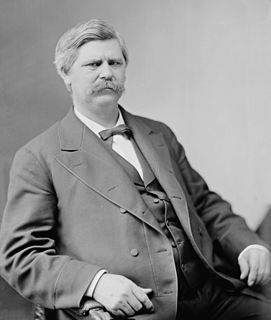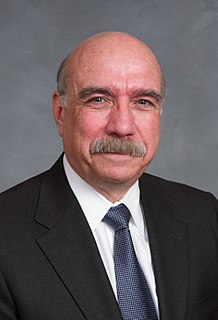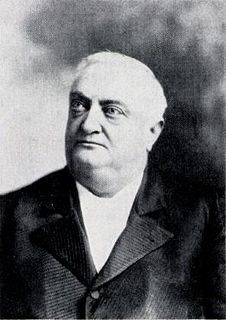Clement Dowd (August 27, 1832 – April 15, 1898) was a Democratic politician in North Carolina who served as Mayor of Charlotte, North Carolina from 1869 to 1871 and as a U.S. Representative from 1881 to 1885.

North Carolina is a state in the southeastern region of the United States. It borders South Carolina and Georgia to the south, Tennessee to the west, Virginia to the north, and the Atlantic Ocean to the east. North Carolina is the 28th-most extensive and the 9th-most populous of the U.S. states. The state is divided into 100 counties. The capital is Raleigh, which along with Durham and Chapel Hill is home to the largest research park in the United States. The most populous municipality is Charlotte, which is the second-largest banking center in the United States after New York City.

Charlotte is the most populous city in the U.S. state of North Carolina. Located in the Piedmont, it is the county seat of Mecklenburg County. In 2017, the U.S. Census Bureau estimated the population was 859,035, making it the 17th-most populous city in the United States. The Charlotte metropolitan area's population ranks 22nd in the U.S., and had a 2016 population of 2,474,314. The Charlotte metropolitan area is part of a sixteen-county market region or combined statistical area with a 2016 census-estimated population of 2,632,249.
Dowd was born at Richland Creek, in Moore County, NC, and graduated from the University of North Carolina at Chapel Hill in 1856. He served in the Confederate States Army during the Civil War. An attorney, bank president and one-time newspaper editor, Dowd was a law partner of North Carolina Governor Zebulon Vance.

The University of North Carolina at Chapel Hill (UNC), also known as UNC-Chapel Hill, Chapel Hill, North Carolina, or simply Carolina is a public research university in Chapel Hill, North Carolina. It is the flagship of the 17 campuses of the University of North Carolina system. After being chartered in 1789, the university first began enrolling students in 1795, which also allows it to be one of three schools to claim the title of the oldest public university in the United States. Among the claimants, the University of North Carolina at Chapel Hill is the only one to have held classes and graduated students as a public university in the eighteenth century.

The Confederate States Army (C.S.A.) was the military land force of the Confederate States of America (Confederacy) during the American Civil War (1861–1865), fighting against the United States forces. On February 28, 1861, the Provisional Confederate Congress established a provisional volunteer army and gave control over military operations and authority for mustering state forces and volunteers to the newly chosen Confederate president, Jefferson Davis. Davis was a graduate of the U.S. Military Academy, and colonel of a volunteer regiment during the Mexican–American War. He had also been a United States Senator from Mississippi and U.S. Secretary of War under President Franklin Pierce. On March 1, 1861, on behalf of the Confederate government, Davis assumed control of the military situation at Charleston, South Carolina, where South Carolina state militia besieged Fort Sumter in Charleston harbor, held by a small U.S. Army garrison. By March 1861, the Provisional Confederate Congress expanded the provisional forces and established a more permanent Confederate States Army.

The American Civil War was a war fought in the United States from 1861 to 1865, between the North and the South. The Civil War is the most studied and written about episode in U.S. history. Primarily as a result of the long-standing controversy over the enslavement of black people, war broke out in April 1861 when secessionist forces attacked Fort Sumter in South Carolina shortly after Abraham Lincoln had been inaugurated as the President of the United States. The loyalists of the Union in the North proclaimed support for the Constitution. They faced secessionists of the Confederate States in the South, who advocated for states' rights to uphold slavery.
After serving as a city alderman, Dowd was the first mayor of Charlotte elected after the Civil War (his predecessor had been appointed by the state governor). While Dowd was mayor of Charlotte, the city police department was established and a new city charter was adopted. [1]
An alderman is a member of a municipal assembly or council in many jurisdictions founded upon English law. The term may be titular, denoting a high-ranking member of a borough or county council, a council member chosen by the elected members themselves rather than by popular vote, or a council member elected by voters.
He served two terms in Congress but chose not to run for re-election in 1884. Dowd worked as the federal tax collector for North Carolina in 1886-1887. He then returned to the practice of law and died in Charlotte, North Carolina on April 15, 1898.
















